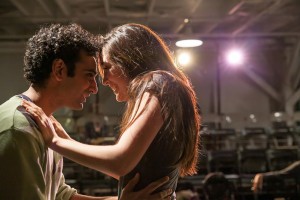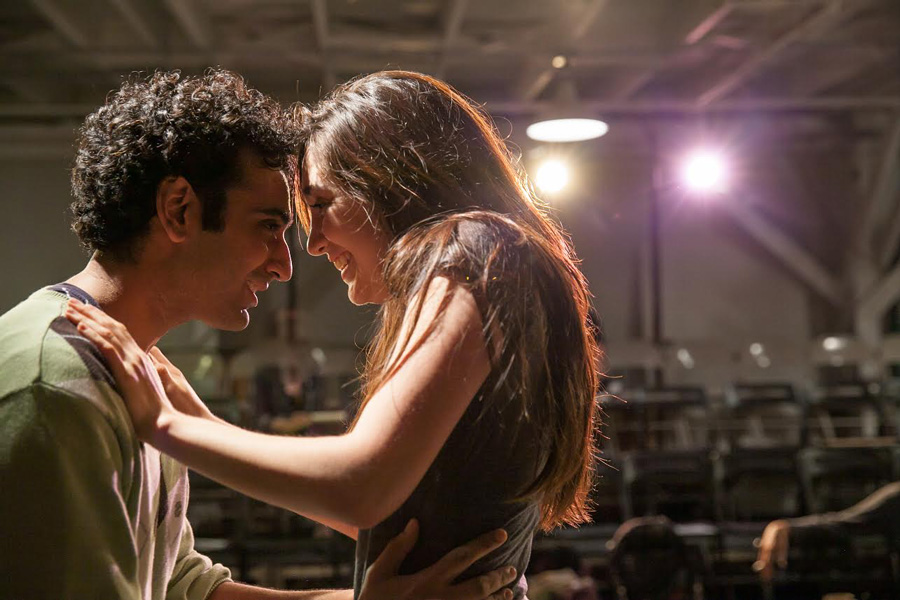Alums star in Shakespeare production
For many people, Shakespeare is an inaccessible, cumbersome obstacle of language meant to torture struggling high school students. Actors Erika Soto and Evan Lewis Smith used to think the same thing, which is why they want Shakespeare-haters to attend their production of Romeo and Juliet at the Independent Shakespeare Company. Opening today, the show has been condensed to a theater-friendly 90 minutes and contains whimsical movement, dance numbers and modern music to accompany the world’s most classic love story.

Wherefore art thou · The newest rendition of Romeo and Juliet, at the Independent Shakespeare Company, features alumna Erika Soto. – Photo courtesy of Grettel Cortes
Soto, who graduated from USC’s B.A. Theatre program in 2011, plays the title role of Juliet. Smith, who graduated from USC’s MFA in Acting program in 2012, plays both Tybalt and the friar. Both actors expressed their excitement for acting in such a classic Shakespearian show.
“You know what the show is and you know everyone else knows the show, so you have to ask yourself what kind of new things can you bring to it, while still being true to the message of the play,” Smith said.
As the Friar, Smith’s character gets to question the two lovers’ decisions.
“We’re saying, ‘You just met this guy, how can you love him?’ We’ve all been on the outside looking in, telling somebody you need to think about this,” Smith said. “But there have also been times when you know in your heart that’s what you want.”
Soto also discussed her connection to her character.
“I feel like it’s the perfect role for me right now,” Soto said. “Juliet evolves a lot through the course of the play. I know what its like to be young and in love and passionate and naïve and innocent and all these things. This is a time in my life when I’m just starting to discover myself.”
Soto and Smith are confident that audiences will be able to connect to the show as much as they have due to the universal themes. By shortening the production, the actors get to the heart of the love story more directly.
“Our take on it is, it’s taking out the air, the unnecessary weight, to focus on naive but true love and the adversity they go through. It speaks to so many people, its timeless,” Smith said. “Everyone has a bit of Romeo and Juliet in them.”
Soto is particularly passionate about presenting an accessible piece of theater. She remembers growing up speaking Spanish in Texas and, after reading Shakespeare in high school, remembered feeling incredibly intimidated by the language of Shakespeare’s plays.
“[Shakespeare] wasn’t for me. I thought ‘This isn’t something I can do.’ It was a foreign language,” Soto said.
Today, Soto loves the Bard, and hopes this show can transform other young students’ opinions of not only theater, but the playwright as well. In addition to the typical studio run, the production will have student matinees and will also tour local schools, where students will be able to go through workshops about Shakespeare and see a performance of the show.
Soto explained that she hopes the production will connect with students in particular. Soto’s sentiments fit directly with the mission statement of the Independent Shakespeare Company, which strives to make classical theater more accessible to new theater audiences. This show in particular, with its young characters and incredibly relatable themes of love and self discovery, is working toward that goal of bringing theater to people who are not typical theatergoers.
Not only does the production seek to grab the attention of audiences through its themes, but also through its innovative staging. ISC’s Romeo and Juliet is full of movement, dance, music and creative props.
“So many students assume Shakespeare is old-timey,” Soto said. The ensemble and production team has worked together to destroy that idea.
“It’s like kids going up into an attic and putting on a play with objects that they find. It’s an out-of-the-box fairytale,” Soto said.
After the show was cut, movement was used to fill in moments of dialogue that had been removed. Scenes such as the wedding are expressed through dance as opposed to speech.
Working as an ensemble was particularly important during these dance and movement pieces.
“It’s great working in an ensemble with everyone throwing creative ideas forth. Together we’ve had to figure out how to make a balcony without a balcony, how to make a room feel like an actual room,” Smith said.
Soto looks forward to the movement helping to change audience’s misconceptions about Shakespeare.
“I hope the audience can say, ‘Wow there’s so much you can do with this language and these plays,’” Soto said. “It’s not removed; Shakespeare isn’t limiting, it’s incredibly empowering and invigorating.”
Combining this creative storytelling with the traditional dialogue and poetic reading of the heightened language is bound to create a production that is not to be missed.
As Smith said, “We all have a bit of Romeo and Juliet within us.”
Romeo and Juliet at the Independent Shakespeare Company, located at 3191 Casitas Ave, runs April 4-May 3 at the Atwater Arts + Innovation Complex and offers student discount tickets. Buy tickets here.

